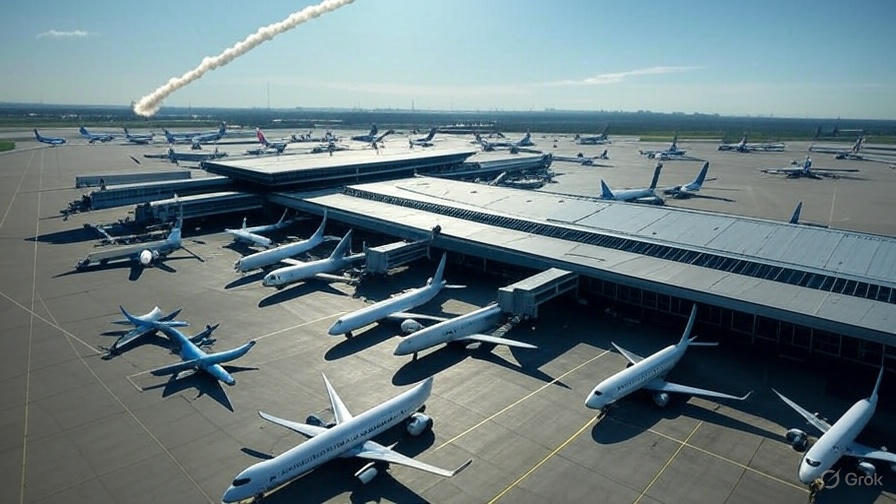The Houthis from Yemen’s Ansar Allah movement have claimed responsibility for a powerful missile strike aimed at Ben Gurion Airport, Israel’s busiest international air hub located near Tel Aviv.
Missile Operation Targets Ben Gurion Airport, Israel’s Main International Gateway
According to the group’s announcement, the operation involved the launch of a Palestine-2 hypersonic ballistic missile. The strike, as stated by the Houthis, successfully hit its intended target — halting operations at the airport. Reports indicate that airport activities were suspended following the impact, although no detailed public confirmation has been provided on the extent of damage.
The hypersonic nature of the missile suggests it travelled at extremely high speeds, making interception more difficult compared to standard missiles. The Houthis claimed the operation was a direct action in support of the Palestinian population, especially in light of ongoing events in the Gaza Strip.
💣 Red Sea flashpoint — Houthi missile attack triggers Israeli retaliation in Yemen
The missile attack, according to the Houthis, was intended as both a symbolic and strategic strike, showcasing their ability to reach deep into Israeli territory. Ben Gurion Airport is a vital link for Israel’s international travel and trade, making it a high-profile target in any regional conflict.
Background of Houthi Hostility Towards Israel
The Houthis’ hostility towards Israel is not a recent development. The group has openly opposed Israeli military actions in the Gaza Strip for years, declaring its intention to take direct action whenever conflict escalates.
During the 2023 Gaza conflict, the Houthis issued clear warnings that they would strike Israeli territory and prevent Israeli ships from passing through critical waterways. This encompassed the Bab el-Mandeb Strait and the Red Sea, two important international commerce lanes.
Following the outbreak of hostilities in 2023, the Houthis began launching missile and drone attacks against Israeli targets and shipping vessels in the region. Their maritime campaign aimed to disrupt Israeli trade and put pressure on the country’s economy.
The attacks were briefly paused after a ceasefire agreement in mid-January 2025. However, the truce collapsed in early March of the same year, leading to the resumption of Houthi strikes. Since then, the group has consistently targeted Israeli-linked ships in the Red Sea and made attempts to hit land-based targets in Israel.
Their operations have included the use of various missile types and drones, with a notable emphasis on long-range weapons capable of bypassing multiple defense systems. The claimed strike on Ben Gurion Airport marks one of the most high-profile actions in this renewed campaign.
Treasury Targets 3 Ships Funding Iran-Backed Houthis in Red Sea
Immediate Regional Repercussions of Ben Gurion Airport Strike
Shortly after the Houthis’ announcement of the Ben Gurion Airport attack, Israel’s defense forces reported that they had intercepted a missile launched from Yemen. The official statement did not directly confirm a hit on the airport, but it acknowledged the presence of missile threats from the south.
Despite the interception claim, the Houthis maintain that their missile reached its target and forced a halt in airport operations. Such conflicting narratives are common in high-tension conflict zones, where each side often seeks to control the flow of information.
Ben Gurion Airport, situated close to the city of Lod in central Israel, serves as the main entry and departure point for foreign travelers. Even a brief suspension of its activity immediately creates logistical and economic impacts. In such circumstances, airlines often reroute, delay, or cancel international flights, affecting thousands of travelers.
The announcement from the Houthis also included a renewed statement of their stance on the Gaza conflict. They reiterated their opposition to what they described as the occupation of Palestinian territories and emphasized that their operations would continue until the hostilities against Gaza residents cease.
Hypersonic Strike Highlights Regional Tensions
The timing of the missile strike comes amid heightened tensions across the Middle East, with multiple regional flashpoints contributing to instability. Missile attacks from Yemen into Israeli airspace represent a significant escalation in both range and capability, as the distance between the two territories is over 1,500 kilometers.
The Houthis’ use of hypersonic ballistic missiles is particularly noteworthy. Hypersonic missiles travel at speeds exceeding Mach 5, making them harder to track and intercept. If the Houthis’ claims are accurate, this would demonstrate a growing sophistication in their missile arsenal — a development that could have implications for regional security dynamics.
The attack also serves as a reminder of the interconnected nature of conflicts in the Middle East. Events in Gaza, maritime security in the Red Sea, and airspace threats to Israel are all intertwined in the broader geopolitical landscape.
While the full extent of the damage and disruption at Ben Gurion Airport remains unclear, the Houthis’ announcement has drawn international attention. The alleged use of a hypersonic missile and the targeting of a significant hub for civilian transit highlight the incident’s seriousness.
Regional actors continue to closely monitor the situation, and officials will provide further updates on the operational status of Ben Gurion Airport.
